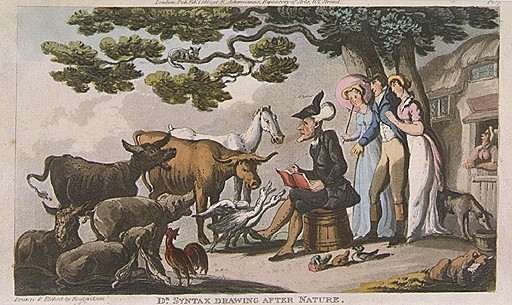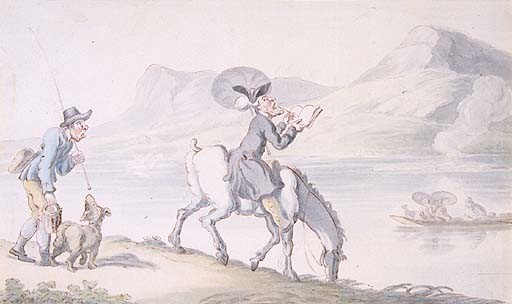What the resident population thought of the tourists
According to Joseph Budworth (1756-1815), in his JOURNAL, Written during a hasty RAMBLE to the LAKES, which was published in The Monthly Magazine for 1 August 1800, the locals did not mind the tourists — but rather those outsiders who came to settle. Budworth received hospitality from a poor family, recording that “These people lament much the influx of gentry amongst these scenes of nature and of peace; though it is not the guest that ‘tarrieth but a day’, whose presence they dread, but the gentlemen who build houses, and reside amongst them”.

West, in his guide, describes the inhabitants as being fully welcoming of the tourist. Of those living in Rosthwaite, Borrowdale, he wrote: “they are hospitable, civil, and communicative, and readily and chearfully give assistance to strangers who visit their region. On missing a track I was directed to observe, I have been surprised by the dale-lander, from the top of a rock, waving me back, and offering me a safe conduct through the difficult parts, and who blushed at the mention of a reward”.
On the other hand “the homely Priest of Ennerdale” in Wordsworth’s The Brothers seems rather bemused by the tourist: “These Tourists, heaven preserve us! / needs must live / A profitable life: some glance along, / Rapid and gay, as if the earth were air, / And they were butterflies to wheel about”.

For the Pennington family of Muncaster the behaviour of some of the tourists could prove an irritation. A diary entry for 11 August 1807 records the following: “the fine Weather has brought many Visitors from the Lakes to view the magnificent Ruins of Furness Abbey. I have observed that those who have the shabbiest Equipages are the most provokingly insolent”.
Thomas Rowlandson, Dr Syntax drawing
after nature, London: R. Ackermann, 1 February 1815, coloured
aquatint, The Wordsworth Trust.
Thomas Rowlandson,
Dr Syntax sketching the Lake, ca.1812, watercolour, The Wordsworth
Trust.
